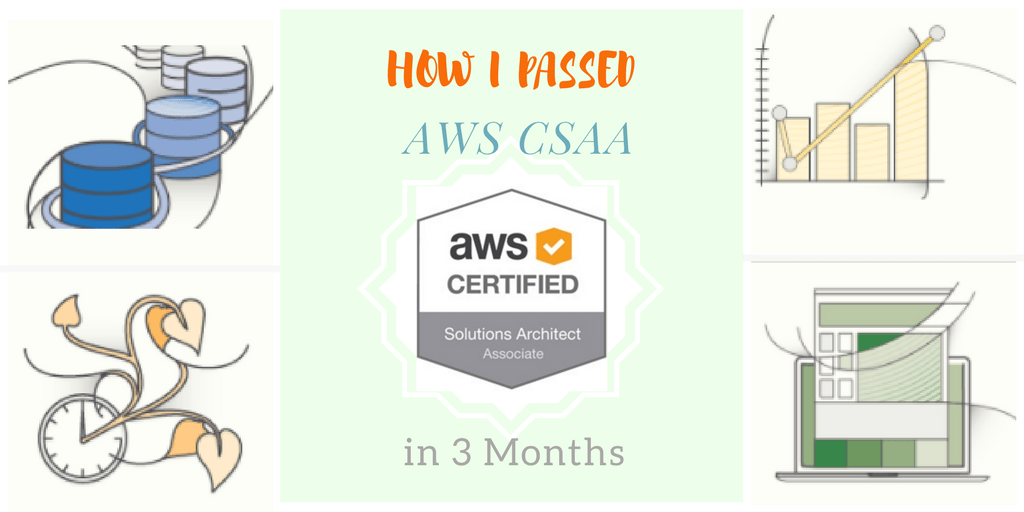How I Passed AWS CSAA in 3 Months

Last week I passed AWS CSAA after three months preparation! I decided to take AWS CSAA on Thanksgiving day last year (11/23/2017) with the original four months study plan. But the study went very well and saved me one month! It took me three months to get my SCEA(Sun Certified Enterprise Architect) 11 years ago. Looks like three months study is good to me for any architect certification.
When I decided to take the exam, the new exam is not released yet. The original version of the exam (55 questions/80 minutes) will be available until Aug. 12, 2018. Let me share with you my study plan so you can also get your certification on time.
Topics and timeline
- Security, Identity & Compliance: IAM, CloudHSM, Cognito
- Storage: S3, EFS, Glacier, Storage gateway
- Compute: EC2, ECS, Lambda, Elastic Beanstalk
- Networking & Content Delivery: Route 53, CloudFront, VPC, API Gateway, Direct Connect
- Database: RDS, DynamoDB, ElastiCache, Redshift
- Management Tools: CloudWatch, AWS Auto Scaling, CloudFormation, CloudTrail, Config, OpsWorks, Trusted Advisor
- Application Services/Analytics: SNS, SQS, SWF, SES, Elastic Transcoder, Kinesis, EMR
For the above topics, if you already knew the knowledge (e.g. RDS) then just give less time to review. If the knowledge is new to you (e.g. Kinesis), then put more time to learn. My timeline for this exam is four phases:
- Learning phase (seven weeks): In this phase, taking the online training class will save your learning time. You can practice on AWS console with free tier account by following 10-minute tutorials. For more comprehensive learning, you can follow step-by-step guides to help you build and launch your AWS project. But I think 10-minute-tutorial is good enough for passing the exam. The course on Cloud Guru has good labs to follow. For any new or challenging topic (e.g. VPC, Lambda, Kinesis), reviewing AWS documentation will give you the overall information. Making study notes only on keywords and/or comparison (e.g. S3 classes, Security group vs. ACL) is helpful for the last minute review on the exam day. During this phase, I studied two to three hours per day, 4 to 5 days per week and I did enjoy the vacation times during Christmas and New Year holiday.
- Practicing phase (two weeks): You can take diagnostics exam in Whizlabs AWS CSAA exam and AWS sample questions as your benchmark. I had a big challenge on the scenario questions in the diagnostics exam (e.g. 6 to 8 lines of the question, each choice with the long sentence) and the clarification on shared responsibilities questions in the AWS sample questions. Based on incorrect answered questions, I did read through the topic in AWS document to solid my knowledge. The briefing Amazon knowledge has some questions. It may help you to study but the answers may not always correct.
- Final reviewing phase (two weeks): I didn’t go through all the white papers. But I strong suggest you read through Overview of Amazon Web Services, AWS Overview of Security Services, and AWS Storage Services Overview. Those white papers really helped me on the exam. For AWS FAQs, since I have solid knowledge on the network, DNS, database etc. though tech refreshes I did on the global systems, I read quickly on VPC, ECS, Lambda, and Kinesis. You may want to base on your mock exams to decide which FAQs for the final reviewing.
- Contingency (one week): just in case if need any extra time to clarify any doubt before the exam. I used this week to go through my study notes, review the four scenarios in VPC (the diagram is very important!), use cases on Lambda, and go though all the incorrect answered questions. I studied 5 to 6 hours per day. When I felt there is nothing I wanted to learn, I scheduled the exam in two days.
Learning materials
AWS documents, 10-minute tutorials, FAQs, white papers
Cloud Guru‘s training course
Study notes based on Cloud Guru’s training course
Whizlabs AWS CSAA exam
Briefing Amazon knowlege
Conclusion
Overall, the questions in my exam are not very difficult by comparing to mock exams. There are no long description scenario questions. But some questions are really tricky to make sure you understand the difference on the terms (e.g. Redshift vs. DynamoDB, EC2 on-demand vs. reserved vs. spot instance). Hopefully, my experience will help you study more effectively and good luck to your exam!





Thanks for the article. Did you find start getting offers to work in AWS as an architect after you gained the certification? I am wondering how lucrative the job opportunities are once you have the certs. I only have the AWS Certified Cloud Practicioner cert at this time.
tks,
Michael
One of the most important reasons to get certified is that it helps you stay ahead of the competition. It will get you into the interviews. The more important thing is your hands-on experience both on AWS and architecture design to guarantee to be successful in your architect role.